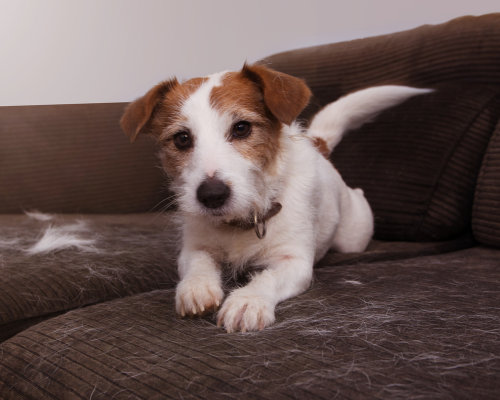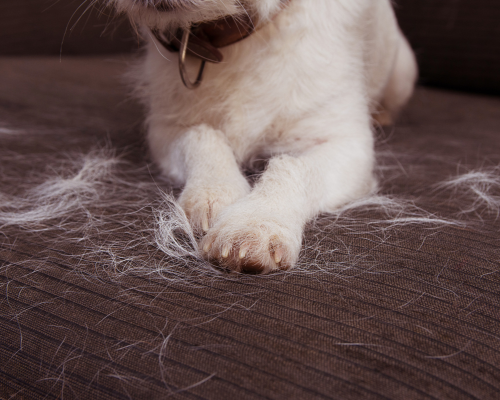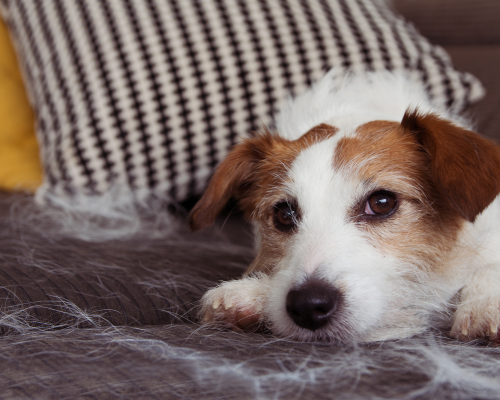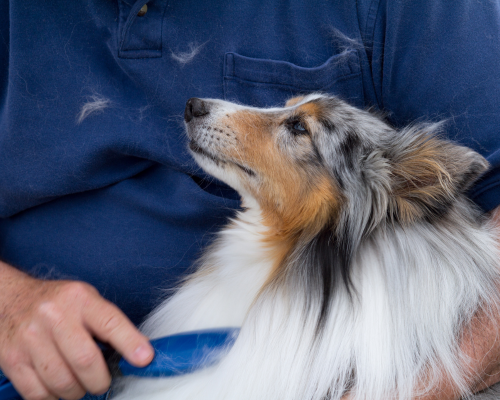Why Does My Dog Eat Hair? Human, Furr? Explained!
Why Does My Dog Eat Hair? Human, Furr? Explained!

Vet Reviewed

By: Sarah Hodgson
October 26, 2023
- Posted in Dogs
Table of Contents
For some odd quirky reason if your dog started eating hair it's not unusual. However, it can be puzzling for us humans to see our dogs eating hair.
In this post, we'll talk about why dogs eat hair and the problems it might cause. We'll also discuss what could happen if your dog eats human hair and give you some tips to stop this strange habit.
Let's dive straight into the post!
Why Do Dogs Eat Hair?
Dogs have a natural instinct to explore their surroundings and investigate different scents and textures. Hair, with its unique texture and scent, can be quite enticing for dogs. However, there is more than one reason and it's hard to give an exact explanation so let's go over all of them one by one starting with Pica.
1. Pica
Pica is a condition where dogs crave and consume non-food items, including hair. This can be caused by nutritional deficiencies or underlying medical conditions.
Pica is not limited to eating hair it encompasses a wide range of non-food items, including but not limited to rocks, plastics, paper, cloth, and even feces. The term "pica" essentially describes the dog's compulsive desire to eat items with no nutritional value.
Read more about Pica
2. Grooming Behavior
Dogs are naturally inclined to groom themselves and others. If your dog is constantly licking or chewing on their own or another pet's hair, it could be a grooming behavior that has escalated into eating the hair.
Self-grooming, also known as autogrooming, is a common behavior in dogs. It involves licking, chewing, or scratching various parts of their bodies which include their fur. If they're eating hair off the floor/carpet or couch then it's most likely not a grooming affected.
3. Attention Seeking
This should be obvious, as dogs love attention! Dogs are social creatures and crave attention from their owners. They thrive on the emotional connection they share with their owners and seek constant validation, love, and attention. Eating hair can be a way for dogs to seek attention, especially if they have learned that this behavior creates a reaction from their owners.

4. Stress or Anxiety
Stress and anxiety can affect dogs just as they do to us humans, and like people, dogs display a variety of coping mechanisms when faced with these emotional challenges. Dogs may resort to eating hair as a way to cope with stress or anxiety.
Just like humans may engage in nervous habits, dogs may turn to hair-eating to soothe themselves. When confronted with these stressors, dogs may exhibit signs of unease, such as pacing, whining, excessive barking, or destructive behavior. In some cases, they might resort to self-soothing behaviors, including hair-eating, to alleviate their anxiety.
5. Boredom
Your dog might be eating hair because he's bored!
Dogs that lack mental or physical stimulation may engage in unusual behaviors, such as being destructive, chewing on furniture or personal belongings. They may also exhibit excessive barking or whining, dig up the yard, or develop unhealthy habits like hair-eating.
Providing your dog with plenty of exercise, interactive toys, and mental is a must in preventing boredom-induced hair-eating.
6. Pack Behavior
Dogs are pack animals and may mimic the behaviors of other dogs in their pack. If one dog in your household has developed the habit of eating hair, other dogs may imitate this behavior.
This natural inclination to mimic behaviors within the pack can also extend to domestic settings, particularly in households with multiple dogs.
7. Curiosity/Exploration
Dogs are naturally curious, always wanting to know what's going on around them. They like to sniff, lick, and sometimes chew on stuff to figure out what it is.
Let's expand on this a little:
- Just Being Curious: Dogs have this thing in them that makes them want to know about everything. It's like when a kid sees something new and wants to touch it and see how it feels. Dogs use their mouths to do this, which is kinda like how babies use their hands.
- Puppy Adventures: Puppies are like tiny explorers. They're super keen on finding out what's what. They'll give things a sniff, maybe give it a little lick, just to get a sense of what it's all about.
- Hair as a New Thing: Hair is interesting to dogs. It smells different, and it's got a different feel compared to a lot of other stuff around. So, when they spot some hair lying around, it's like a new puzzle piece they want to check out.
- Making Sure It's Safe: While it's totally normal for dogs to be curious, it's our job as their buddies to make sure they don't get into anything that could be harmful. That means keeping stuff that's not meant for chewing or eating out of their reach. That way, they can have all the exploring fun without any worries.
8. Hungry Or Food Obsession
In some cases, dogs may eat hair as a result of hunger or simply food obsession. If your dog is not receiving a balanced diet or is constantly fixated on food, they may resort to eating hair as a substitute.
It's best to ensure you are giving your dog all the nutrients he needs when it comes to his full diet.
Well, there you have it! Let's dive into the dangers of hair-eating in dogs.
The Risks and Dangers of Dogs Eating Hair
While it may seem harmless at first, dogs eating hair can pose several risks and dangers. The first concern is the potential for hairballs. When dogs swallow hair, it can accumulate in their stomach and form clumps known as hairballs. Dogs aren't cats they can't just spit them out like cats do. These hairballs can cause discomfort, digestive issues, and even blockages in the digestive tract.
Another risk is the possibility of hair causing an obstruction in the intestines. If a dog swallows a substantial amount of hair, it can become tangled in the digestive system and prevent the normal way for food to go in. This can lead to severe pain, vomiting, and in some cases, may require surgical intervention. (Yes, that does sound scary but it's the truth).
Hair can also pose a choking hazard for dogs, especially if it gets caught in their throat or windpipe. This can result in difficulty breathing and require immediate vet attention.

What Happens If a Dog Eats Human Hair?
If your dog has a liking for eating human hair, you may be wondering if it poses any specific risks compared to their own fur.
While human hair is not toxic to dogs, it can still cause similar issues as mentioned earlier, such as hairballs, digestive blockages, and choking hazards. Also, human hair can carry bacteria, dirt, and other foreign substances that may be harmful if ingested.
If your dog consistently consumes large amounts of human hair or shows signs of discomfort, it's best to consult with your veterinarian.
How To Prevent Your Dog from Eating Hair
Preventing your dog from their in hair-eating habits requires a multi-faceted approach. Here are some tips to help change this behavior:
- Regular grooming: Ensure that your dog's coat is well-maintained and free from excessive shedding. Regular brushing and grooming can help remove loose hair and reduce the temptation for your dog to eat it.
- Provide mental and physical stimulation: Engage your dog in regular exercise and provide them with interactive toys and puzzles to keep their minds occupied. A mentally and physically stimulated dog is less likely to resort to hair-eating due to boredom.
- Supervise and redirect: If you catch your dog trying to eat hair, calmly redirect their attention to a more appropriate activity or offer them a chew toy or treat to distract them.
- Address underlying issues: If your dog's hair-eating behavior seems to be triggered by stress, anxiety, or other underlying issues, consider consulting with a professional dog trainer or animal behaviorist. They can help identify the root cause and develop a tailored behavior modification plan.
- Keep hair out of reach: Ensure that hair, whether it's yours or from other household members, is kept out of your dog's reach. Secure hair accessories, such as hair ties or clips, and regularly clean up any shed hair from floors and furniture.
When To See a Vet?
While occasional hair-eating may not be cause for concern, it's important to monitor your dog's behavior and seek veterinary advice if necessary. You should consult with a vet if:
- Your dog consistently eats large amounts of hair or regularly displays hair-eating behavior.
- Your dog shows signs of discomfort, such as vomiting, constipation, or difficulty passing stool.
- Your dog experiences a blockage or choking incident related to hair ingestion.

The Bottom Line
So there you have it, understanding why dogs eat hair can help you address this behavior and ensure the well-being of your furry companion.
While it may be a puzzling habit, it's essential to take measures to prevent your dog from consuming excessive amounts of hair. Regular grooming, providing mental and physical stimulation, and addressing any underlying issues can help curb this behavior.
Remember, if you have any concerns about your dog's hair-eating habits, don't hesitate to seek advice from your veterinarian. Stay hairy!

Subscribe to Petfluence!
Get updates on the latest posts and more from Petfluence straight to your inbox.